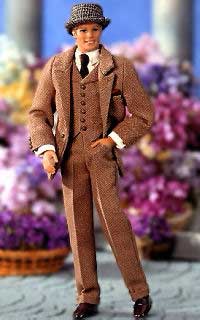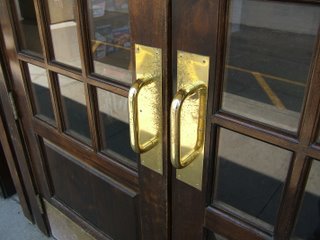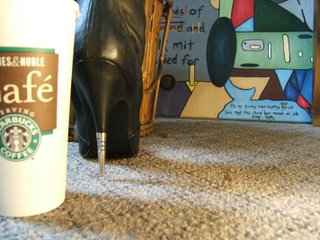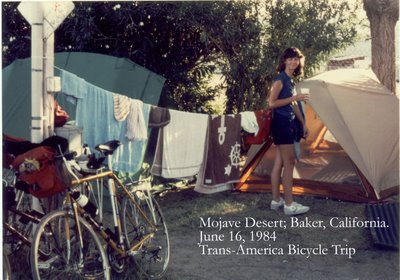It is already the following weekend, and I have yet to tell you about my walk of weekend last.
On Sunday the twelfth, I walked 27 miles. It was easy.
I awoke up at 5:00 a.m., excited to begin. It was rainy and dark, but warm. I love the pre-dawn dark because I own the day then. By the time the sun comes up the world is alive—I prefer it sleeping. Jesus rose early, before the sun, and walked into the mountains, alone, to pray. Self-propelled motion becomes a prayer to me, and each step a thanksgiving to God that I am alive.
I lightly boiled my three eggs, sprinkled my oatmeal with ground flaxseed and wheat germ, slugged down a double-strength cup of black coffee, drank four glasses of water, poured two liters of lemon-lime Gatorade into the bladder inside my Camelback Blowfish pack, hung a plastic sandwich-bagged whole wheat, wheat germ, natural peanut butter and honey sandwich from the waist strap of my pack—and was away.
I floated. I walk a nine-mile block: three miles up, one and a half across, three down, then another road across like the first. All the miles, this morning, are floating. Feeling fresh from a day off, I am hydrated like a lake: the key to success.
The rain comes lightly and my raingear works: it’s called Rainshield, the brainchild of the 3M company; Gore-Tex is sievey compared to it; remember that. Inside my hood, I feel indoorsy. The black galoshes keep unwanted roadwater off my socks and out of my shoes. Roosters crow, the rain does not stop them. They are my companions across Crescent Road, these crazy birds. I never see them, but I like what they do when I don’t have to live by them. They cry out of nowhere; I like their language.

I sip Gatorade through my drinking tube. It is a wonderful thing, this tube. The modern pedestrian need not stop to fumble with old-fashioned bottles. The tube of the bladder is blue, snaking from the back o’ the pack o'er my right shoulder. There is a bite valve, which is blue and yellow; the materials are clear. A marvel of science, all this is. I stick the valve in my mouth and return both arms to their work. I bite the valve and suck. The elixir, still cold from the refrigerator, comes in peristaltic rushes. The elixir is lemon-lime Gatorade, which I imagine to be cotton-candy syrup. I think this in my mind:
I am drinking the syrup of cotton candy. Ahh, that is so good—and at the same time it replaces electrolytes and renders the perfect combination of calories, carbs, sugars, water, and sodium, unto my system. Gatorade, the elixir of the gods. Had it been available in first-century Palestine, Jesus would have drank it for sure.
I sit down at a well in Ritchville, same as Christ. This is a drinking place at the Ritchville rest stop, but without loitering women. There is a rusty green-handled crank here instead, protruding from a metal pipe stuck far down into the groundwater. A person toting his own Gatorade, however, eschews such primitive refreshment. So I sit and rest for two minutes, get up and go. It is still dark, thank Jesus.

North up Route 9 now, when I will eat my sandwich. There are not many cars on Sunday morning. I walk on different sides of the road, depending on what the cars do and how loathe I am to die, which is pretty loathy now that I’m happy on the majority of days.
I imagine that my sandwich is a maple-filled creamstick. It is not that I crave such a thing (though I used to, many of them, the icing wet with condensation from the plastic wrapping), but that the sandwich actually tastes like this, to me. I misspoke to say I imagined the taste; I take the taste it gives, which is that of a product of the bakery I just mentioned.
My legs work independently of me, or so it seems. It is so, even at seven miles when turning off the highway onto Snyder Road toward home and the end of the first nine-mile loop. I am my own passenger, sitting atop these amazing appendages with shoes attached, watching them work. They are transporting me—that’s how it feels. I am only looking out the windows, thinking of other things. I am thankful to be whole. (I am thinking of you, Sheryl, who have lost parts of your body to cancer. I am thinking of you this morning; I envision your wheelchair and I want God to give you joys not requiring legs; there are many such joys; I want you to have them; this is my prayer for you.)
The first lap ends, and I’m back home. I stop in to kiss Melody good morning. I make another sandwich, drink four more glasses of water, and top off my drinking bag: another liter of Gatorade. It’s a twenty-minute break in all, then back on the road, and happy to be there.
Starting the second nine-mile loop, I’m as fresh as at five-thirty a.m—how does that happen? The sun has come up (behind clouds, it only brightens things a little), but everything else is fine.
At thirteen miles, I cannot believe the walk will be this easy. At fifteen miles, I think the same again. Seventeen miles arrives, and I’m still waiting on the tiredness. The rain has stopped, and the warm air feels so good. It is so unlike the winter I’ve been walking through on my weekly eight-milers. My training is paying dividends now.
Eighteen miles is in the bag (there is no more Gatorade there, however), and I’m none the worse for it—in fact, I’m better. I’m high. Aaron and Melody are in the living room, and I babble at them. I laugh and say things, but just what things I don’t know. High, am I, on endorphins, inebriated in the afterglow of gentle, extended exercise. (I have walked all eighteen miles in under fifteen minutes a mile. The time, less breaks, is four and a half hours.) All my bones feel greased. Nothing inside me cracks or creaks. I have not worked hard, only walked correctly. There’s a flush to my face. “It’s the Gatorade,” says Aaron.
I go to bed and try to take a nap. My plan: two laps in the morning, nap, attend a birthday party, walk the final nine miles at 4:30 in the afternoon.
Sleep won’t come. Melody’s nightwear hangs on the doorknob. The varying endorphins fight friendly brawls within me, utilizing armholds and legholds never before seen. The covers of the bed shroud all this, and keep it humid and loose, away from other mortals. Perhaps this is what life in the womb was like, when outside sounds came muted through the membranes.
Two of the boys’ cousins turned certain ages over and under ten—can’t remember which or for whom—but my sister-in-law Mindy made a fabulous red soup containing vegetables and pasta pieces that resembled stars. I eat two bowls, drink coffee, and look forward to the four-thirty lap. How will it feel? It has been twenty years since I have covered so much distance on foot.
It’s crazy. I’m as fresh at 4:30 p.m. as I was when beginning at 5:30 a.m. When will it hit? The sun finally shows itself (it’s 5:30 p.m. now), and sets everything east of it aglow. I’m thankful for the sun, but not for the people. There are people out now, in their yards and in their cars. They are strangers to me and I cannot fellowship with them. But one man waves, and I wave back. I liked it better in the morning, though, in the rain. I owned the road then, and the roosters were mine. But now I’m a part of everything; I guess that’s okay if one embraces the everything.
Stopping again at the well, everything looks different. Was this the same drilled hole of thirteen hours ago? It has an altered personality now, it’s less mindful of me. I am not as fond of it, and I leave it within two minutes of arriving at it; I have walked twenty-three miles.
At twenty-five miles, the feet finally feel something. That, and a small twitch goes up my right hip. These things are nothing, really. I’m still moving easily. It does not seem like work.
My house has come now, and I stop in front of it. My wife is in there, and so are all my kids. I’m happy that they give me this freedom—to be apart from them and with them simultaneously. Home is a joyful place when one has been away at wells, and fellowshipping with roosters and people who wave. The roosters are fine, the well does its work, the waver tends to his yard, but there is no place like the space in front of one’s own refrigerator, and near the drawer where Melody stores the amazing zip-locked sandwich bags, recently purchased by the family patriarch.

© 2006 by Martin Zender
 There is a miraculous little cubicle in my upstairs bathroom, enclosed by a curtain, containing a nozzle such as the one in my kitchen, only bigger and higher—situated over my head. The nozzle is unique in that someone has drilled lots of little holes into it. But you haven’t heard anything yet. There are two knobs in this cubicle, same as in the kitchen, and when I turn the left knob to the left, hot water comes from the nozzle. Hot water! Hot water with which I bathe! People in the know tell me that this has something to do with a water heater and, once again, a pump. But once again, I do not care to hear about it. It’s a miracle, and that’s the end of it.
There is a miraculous little cubicle in my upstairs bathroom, enclosed by a curtain, containing a nozzle such as the one in my kitchen, only bigger and higher—situated over my head. The nozzle is unique in that someone has drilled lots of little holes into it. But you haven’t heard anything yet. There are two knobs in this cubicle, same as in the kitchen, and when I turn the left knob to the left, hot water comes from the nozzle. Hot water! Hot water with which I bathe! People in the know tell me that this has something to do with a water heater and, once again, a pump. But once again, I do not care to hear about it. It’s a miracle, and that’s the end of it.































